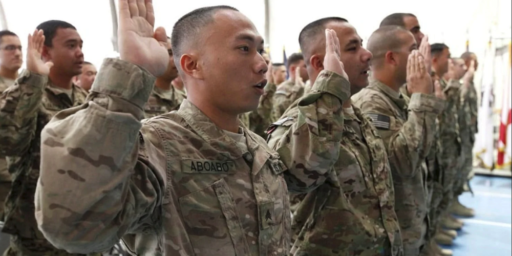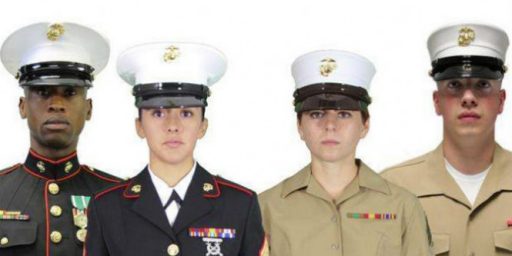Joint Military – Peace Corps Program Being Reconsidered
Both the military and the Peace Corps are wary of a program whereby military volunteers can shorten their commitment by going into the Peace Corps or similar programs.
Military’s Civic-Service Option Is Reconsidered (Minneapolis Star Tribune, Oct. 6)
Under a post-Sept. 11 initiative touted by the military in the past year, recruits can shorten their active-duty terms by volunteering for civilian organizations such as AmeriCorps or the Peace Corps. […] But before recruits get a chance to apply for community service, Congress might remove the Peace Corps option. The reason: lingering worries that in an age of terrorism and anti-Americanism abroad, the military and the Peace Corps are a dangerous mix. U.S. Rep. John Kline, R-Minn., a retired Marine colonel, is spearheading the effort to separate the two forms of national service, with the support of a host of former Peace Corps volunteers.
For its part, the Pentagon has shown signs of ambivalence about the 2003 National Call to Service program, even as recruiters have had to work harder to fill their ranks. “I’ll be frank,” said Kline. “My own preference is not to equate this other national service with military service. … Military service is different from all other forms of volunteerism. In the military, you’re not only asked to do something hard, you’re ordered to do something hard. And not only are you putting your life and limb in danger, but you might be ordered to kill other people. It’s not the same.”
Given the choice over the past year, more than 4,300 recruits nationwide have signed up under the National Call to Service program, which was quietly slipped into a 2003 military spending bill that year by Sens. John McCain, R-Ariz., and Evan Bayh, D-Ind. “The tragic events of September 11 have united Americans in their desire to help our nation at war,” McCain said of the bipartisan initiative.
[…]
University of Maryland sociology professor David Segal, an author on the postmodern military, sees two problems with Kline’s idea: “It’s an attempt both to make the service component of citizenship less international, and, frankly, to take the position that the military has taken, that they don’t want to be part of a system in which military service competes with civilian service.”
[…]
Kline says he has no problem with the Peace Corps, and is happy to see college students — even ex-military people — serve their country by doing community service abroad. “What I don’t like is making it the completion of military service,” he said.
An organization of former Peace Corps volunteers agrees with him. “The blurring of the line between the military and the Peace Corps is disturbing,” said Kevin Quigley, president of the National Peace Corps Association, which represents Peace Corps alumni. Increasingly, he said, U.S. officials have begun to worry about Americans abroad as targets of political violence, and any association with the armed forces doesn’t help. “Perceptions can morph into reality, and we all know that there are more risks to Americans [abroad] than there were a few years ago,” Quigley said. About 1,500 Peace Corps volunteers currently serve in predominantly Muslim countries, where the U.S. war in Iraq is most controversial. Peace Corps spokeswoman Barbara Daly.
But whatever changes might come to the National Call to Service, it is unlikely to have much effect on the Peace Corps. “We’re still an independent agency, and our recruitment process is the same,” said Peace Corps spokeswoman Barbara Daly, noting that opting for National Call to Service does not guarantee a soldier a place in the Peace Corps. “They still have to go through our rigorous recruitment process. Quite frankly, [the military] is a longer way of getting into the Peace Corps.”
The concerns cited by both Kline and Quigley are well taken. Service in the Peace Corps is in some ways more arduous than military life, in that people are often put into remote villages without a support system of friendly American faces. On the other hand, the physical risks are undeniably less. That might change, though, if the perception is that the Peace Corps is somehow an adjunct of the U.S. armed forces.






This was a stupid idea in the first place. Peace Corp volunteers should not in any way be affiliated with the DoD. They do good work and we shouldn’t be giving anyone the impression they are DoD spies out collecting information on the people they are trying to help.
I would say that the “impression” gained by foreign cultures kind of depends on where you are deployed. Even a long haired, brikenstock wearing hippie would not be warmly welcomed as an American citizen in many countries.
Yet, I’ll agree that there is an interesting conflict of values: those traditionally military, and that of Peace Corps.
If you enlist in the military, you enlist in the military. We paid to trian them as soldiers, we should get our money’s worth out of them. If you want to join the Peace Corps, join the Peace Corps. I see no need for such an arrangement in an all volunteer military setting. The Peace Corps might be an acceptable alternative in a draft environment. I don’t see the point in our current situation.
Getting a little real thinking–as opposed to idealization–going on in Peace Corps might not be a bad thing, actually.
And not all Peace Corps assignments are “safe.” There’s a trade-off in the kinds of dangers being faced. One of my brothers was Country Director for Peace Corps in Niger. He had to close the program because too many volunteers were getting sick and dying, simply because they could not get access to clean water, nor to the even minimal technology to purify the water… things like “fire”.
I suspect, though, that the cognative dissonance resulting from a former soldier working in the PC would be insuperable. The world views are dramatically different for the most part.
John McCain working with the Democrat de jour can hardly be called bi-partisan now can it?
While I applaud anyone who chooses to enlist in the military or serve in the Peace Corps, they are 2 very different commitments, and should not be combined.
Interesting. I currently attending a military academy, technically Active Duty, and cannot join the Peace Corps until at least 7 years down the road, after my commitment. I would LOVE for a program like this to be put in place, but I understand where people are coming from. I’m not even sure if Officers are eligible for this program, as I just heard about it today.